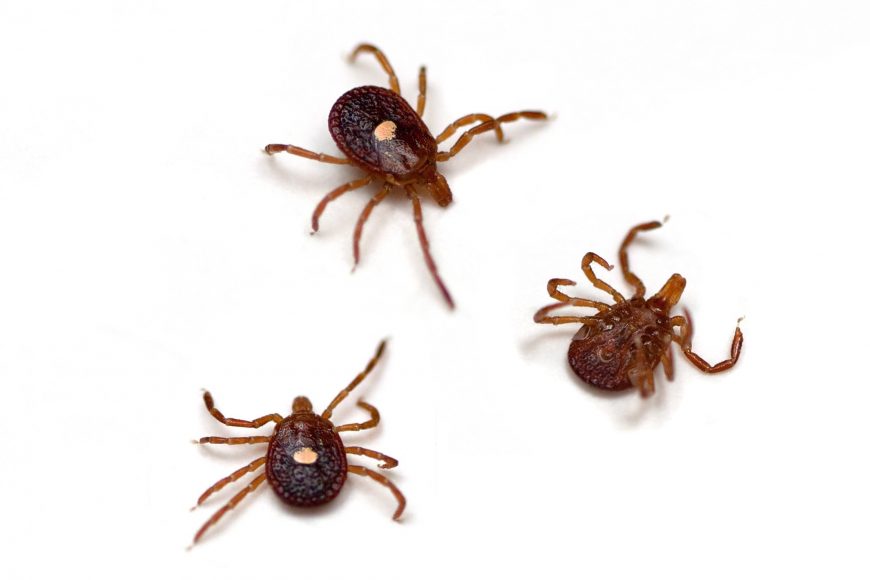- By CycreekPestAdmin
- In General
- Tags General
Everyone knows about Lyme disease, but did you know there is a tick that can cause you to be allergic to meat? The Lone Star Tick not only carries disease-causing pathogens like other ticks, but can also cause a sensitivity to certain foods. This tick has been expanding its territory over recent years. As of 2018 there were more than 5000 known cases in the United States, a large increase from just a few dozen cases from a decade ago.
What Is the Lone Star Tick?
Officially called Amblyomma americanum, the Lone Star Tick got its name from the white spot that sits in the center of the back of the adult female. The presence of this tick is spreading rapidly throughout the eastern and southeastern parts of the US, which may be linked to a swelling deer population throughout the same areas. These ticks are not just annoying but may be dangerous to the health of your family.
Harmful Effects of the Lone Star Tick
While this particular tick doesn’t carry Lyme disease, it can be a carrier for viruses, bacteria and this unique carbohydrate that can cause an allergic response through the immune system. Some of the common occurrences from a Lone Star Tick bite include:
Infections
Just like with any tick bite, infections can be transmitted from Lone Star Ticks. Ehrlichiosis is a bacterial infection that causes fever, body aches, and other flu-like symptoms. Tularemia is another tick-borne infection that can spread to the respiratory system. Swollen lymph nodes in the neck, mouth ulcers, sore throat, and fever are symptoms of tularemia. Any of these symptoms appearing following tick exposure should prompt an immediate visit to the doctor.
See Also: 8 Facts You Didn’t Know About Ticks
Allergies
The alpha-gal allergy is named after a carbohydrate found in the cell membranes of most mammals. When a Lone Star Tick bites, it may leave behind the alpha-gal sugar which the human body sees as a foreign substance, engaging the immune system to fight it off. When an affected person eats meat from certain mammals, they may experience severe allergic reactions such as a rash, hives, itching, stomach ache, vomiting, diarrhea and other gastrointestinal issues. Foods causing these alpha-gal allergies include beef, pork and lamb, and sometimes milk.
Coronary Problems
Recently a link has been discovered between alpha-gal-sensitive patients and susceptibility to clogged arteries. One study showed that the plaque buildup in people with the alpha-gal allergy was 30% higher than those without the allergy, and the structure of the arteries in people with the allergy was less stable. The research is still in early stages, but this type of connection means that the alpha-gal sensitivity could put people at a higher risk of heart attack, stroke, and coronary artery disease. the rest of your life.
Prevention Tips
When it comes to Lone Star Ticks, avoidance and prevention are your best defense.
Awareness
- Be aware of places where ticks may be hiding. Grassy, wooded, or brush-filled areas are often attractive for ticks, so stay on wide open paths when outdoors
- Wear protective clothing while outdoors
- Perform regular tick checks on the clothes and body of yourself and family members after coming in from outside
- Don’t forget to perform tick checks on your pets
- When possible, take a shower within two hours of coming in from outside
- Maintain your yard well, removing plants that might be attractive to deer
Bug Spray
Tick-repellent bug spray should be used whenever outdoors. DEET repellent is effective but strong so it should be applied to the clothing, not the skin.
What To Do If You Are Bitten
If you suspect that you have been bitten by a Lone Star Tick, first gently remove it with tweezers. Clean the wound with soap and water, then watch for signs and symptoms of illness over the next few days.
See Also: How to Safely Remove a Tick
Blood Test
If you have been bitten by a Lone Star Tick and aren’t sure about a potential allergy, ask your doctor for an alpha-gal blood test. Even if you don’t develop a meat allergy, your doctor should be aware of your exposure to alpha-gal for your future health.
Avoid Additional Tick Bites
The good news about the meat allergy related to the Lone Star Tick bite is that it can wane and resolve itself over the course of a few years. This means that people with the allergy should be particularly careful to follow prevention tips and avoid additional tick bites to restore their immune system to normal.
While ticks love the great outdoors and don’t infest homes, it is still important to pay attention to ticks that may be brought into your home on pets or people. For Houston tick control and other pest concerns, consider Houston pest control company, Cypress Creek, to keep your home and property protected throughout the year.



